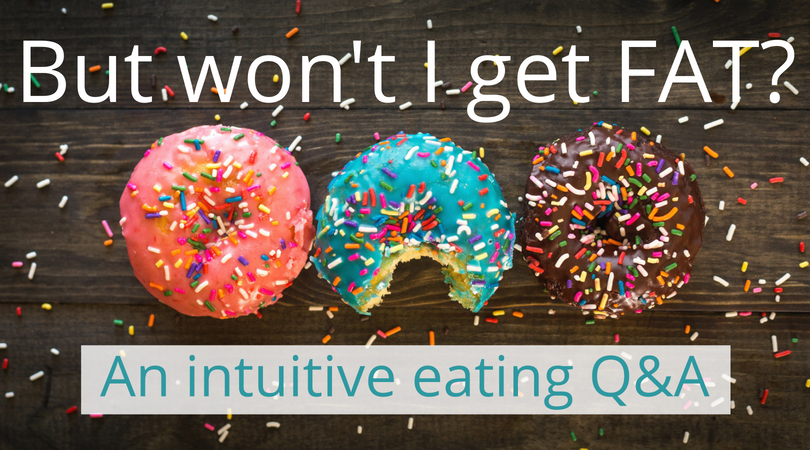
I’ve had a number of people ask me about Intuitive Eating lately, so I thought I’d write a short blogpost about this looks like for me and my clients.
The practice of intuitive eating was not taught during college or my dietetic internship, so it’s been a journey of educating myself via self-discovery, taking intuitive eating-related courses, reading books, researching articles, and having discussions with other coaches, nutritionists, and dietitians who practice and teach intuitive eating.
What exactly is intuitive eating?
The concept is based upon your body’s wants vs. needs, but this looks different for everyone.
In the book, Intuitive Eating, which I highly recommend, intuitive eaters are described as people who “march to their inner hunger signals, and eat whatever they choose without experiencing guilt or an ethical dilemma.”
For me, intuitive eating is checking in with myself and not feeling guilty when I eat past my level of comfort. It means that I can order pizza at a restaurant but can stop eating when I feel full. It means being hyper aware of how my body feels and noticing my hunger cues. It means that I can acknowledge that I’m eating more chocolate than usual because I’m stressed, bored, or lonely.
Ultimately, intuitive eating means that I have control over my body’s food choices.
And that, my friend, is powerful.
Why intuitive eating?
In short, because dieting is not sustainable and intuitive eating isn’t some sort of diet plan. When I worked for a non-profit I remember constantly sympathizing with clients who just weren’t meeting their weight goals, despite meeting their caloric goals, and I KNEW that it was more than reaching a number on the scale. Intuitive eating isn’t restrictive, but restorative. It doesn’t use guilt tactics to make you feel better or worse about yourself and allows you to have the freedom to decide for yourself.
But won’t I gain weight?
It depends. Some people, when following intuitive eating, notice that they stop eating when full and might notice a difference in their clothing as a result. But keep in mind that intuitive eating is not a weight loss/gain program. Clients who have a history of eating disorders might gain body weight because their body is used to running on lower calories, and that’s okay. Every body is a unique, and their experience with intuitive eating will be based on their personal history with food. One of the first assignments I give to my intuitive eating clients is to have them ditch the scale. Remember, YOU determine your worth, not the scale.
Does this mean I can eat whatever I want?
Yes and no. At the root of intuitive eating you’ll find awareness. It means knowing when to stop eating because you’re full and knowing how to turn food down when offered by a friend or family member. It means checking in with your body and noting the level of comfort and discomfort in your stomach. It’s really a journey of emotions and battling through insecurities.
How long does it take to be an intuitive eater?
There is no specific answer to this. The journey towards intuitive eating can be lifelong, and that’s okay. You will likely undergo times of high and low stress and might even eat accordingly to that stress. The whole point of intuitive eating is to be okay with your highs and lows, but to ultimately stay on the path of addressing your body’s needs. I’m not perfect and constantly find myself going back and forth between emotional eating and eating according to my hunger cues. I’m human and try my best to not feel guilty through the times that I neglect my fullness and push past because the food is just so darn delicious. It’s a JOURNEY.
How do I practice intuitive eating?
I don’t recommend starting intuitive eating alone and, bias aside, I believe you should work with someone as you transition into intuitive eating.
At the least, check out the Intuitive Eating book I mentioned earlier, and begin to follow people who practice intuitive eating. You can sign up for my newsletter and/or follow my own journey on Instagram (business account or personal account.
Can I work with you?
I would love to help people transition into an intuitive eating lifestyle and am currently accepting new clients.
If you’d like to explore intuitive eating together and end this diet mentality of perfectionism, email me at amanda.fulcio@gmail.com with the subject Intuitive Eating Consult. We can hop on a 30 minute complimentary call to see whether or not one of my programs might be a good fit for you.
